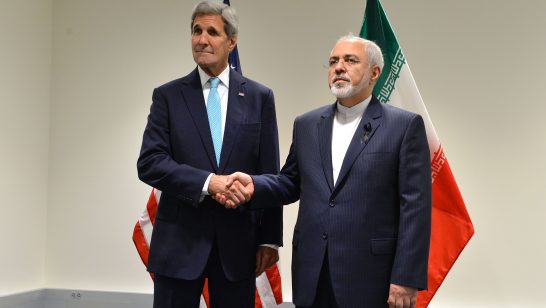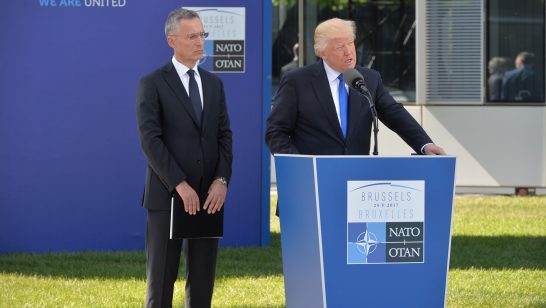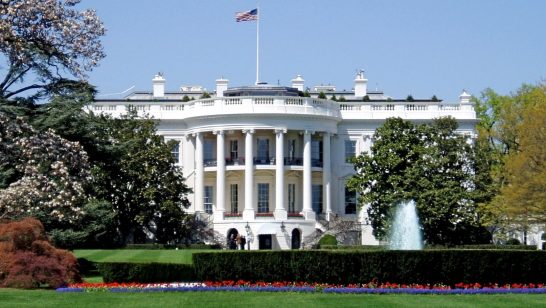
It may not feel like it, but the transatlantic security relationship finished the first year of Trump’s presidency a little better than where it started. After the drubbing NATO received from Donald Trump during the campaign and in the first few months after his election, it could have been much worse. At least his administration continued the efforts begun by the Obama Administration to deal with Russian aggression in Europe, especially the build-up of US forces in Europe and the strengthening of the NATO deterrent against Russia. And President Trump did finally tip his hat to Article 5. But there can be no argument that the transatlantic security relationship also finished the year bruised and battered to an unprecedented degree, with Allies unsure whether there were still shared values or even a shared world view. There was even less confidence that Trump’s commitment to NATO was sincere.
What Trump’s rhetoric did in his first year was to unleash the two genies that have haunted the US-European relationship for years: for Europeans, that Europe was forever tied to US leadership—for better or worse; and for Americans, that the US was condemned to always carrying the defense load for “deadbeat Allies”. Trump the deconstructor smashed the bottles where these two genies lived, releasing them to cause havoc in the relationship. This has had the effect in Europe of injecting new energy into the quest for a continent decoupled from US leadership. In the US, it wasn’t just Trump’s political base that was satisfied at finally seeing the US grievance publicly, albeit rudely, aired – including the threat of “fix it, or else!”
So where does this leave us as we go into Trump’s second year? In terms of leadership in the West, Donald Trump appears to have no interest in that role and seems to be reducing US engagement globally. Except for Macron’s early efforts to think strategically about a stronger European role in the world, no European leader has yet stepped forward with the political juice to actually move Europe in his or her direction. Wheel spinning is what will pass for political leadership in many Allied capitals in 2018.
This summer’s NATO Summit offers the possibility of redemption or disaster. On redemption, US Defense Secretary Mattis could lead an Alliance effort to produce Summit deliverables that could result in improved readiness and capability of Allied forces. Perhaps he could announce the permanent deployment of another brigade of US forces to Europe. The EU’s Permanent Structured Cooperation (PESCO) structure could also show signs of bringing about some limited improvements in European military capability. And of course Allied defense spending could show a further uptick towards the 2% goal. Yet, failure as narrowly defined by Donald Trump stalks NATO’s corridors. Trump could cast a momentary glance at Allied defense spending and conclude that the scoreboard shows too few Allies making progress and decide that the US commitment to Article 5 will be transactional: nations will have to pay to play. Yet, it will be a pity if that fear of Trumpian backlash causes the Summit to be all about the 2%. It should be about showing NATO’s adversaries that it is unified as an Alliance and is working together to counter efforts to undermine democracy in Europe and in the US.
The only thing we know for sure about the impact of Donald Trump on the year ahead is that we don’t know for sure. The bones of many an “expert” who thought he or she knew what Donald Trump would do litter the hallways of Washington. But if you want to know who is winning, it is Vladimir Putin. He hardly lifts a finger to have the West question its own values. As for the idea that there is some kind of “bromance” between Putin and Trump, you can forget it. The only bromance either of the two men have is with themselves.
But frankly Donald Trump is not what the West should worry about the most. Breathless reporting about Trump shouldn’t distract from the real crisis: managing, rather than muddling through, an era of rapid geo-political change in the West.
“The West” as a political concept has always had to adapt to change as the transatlantic political scene evolved, driven by new generations of politicians with different priorities and shaped by outside shocks. This evolution began long before Donald Trump. He has just accelerated the pace of change and stunned the system by taking the US out of a leadership role that nations have come to expect, a role that had the US working with Allies to manage change while keeping the transatlantic community intact.
But Trump’s victory, Brexit, and the political gains made by right wing populist parties throughout Europe are clear warnings that something more fundamental is wrong in the West, beginning at the grass roots. It is too easy to discount this discontent, blaming populist anger on ignorance, naivety, or stupidity. But fingers are being pointed at the political elites, both in the Washington “swamp” and in Brussels. People just don’t like the way they perceive things are being run nor do they like the “experts” running the show. Trump tapped into this discontent, and so do some politicians in Europe.
This anger is what is most worrying. Donald Trumps come and go. But the elites who forever have been calling the shots in Washington, Brussels, Berlin, London and Paris should be on notice that they are living on borrowed time if they cannot identify the source of discontent and do something about it. The elites should forget Donald Trump for a while and look in the mirror.
The opinions articulated above represent the views of the author(s), and do not necessarily reflect the position of the European Leadership Network or any of its members. The ELN’s aim is to encourage debates that will help develop Europe’s capacity to address the pressing foreign, defence, and security challenges of our time.



